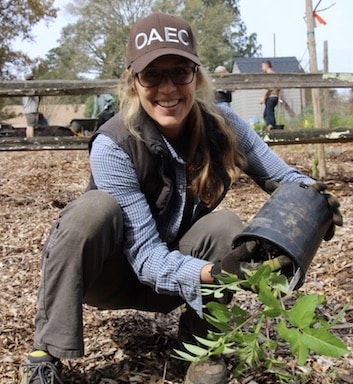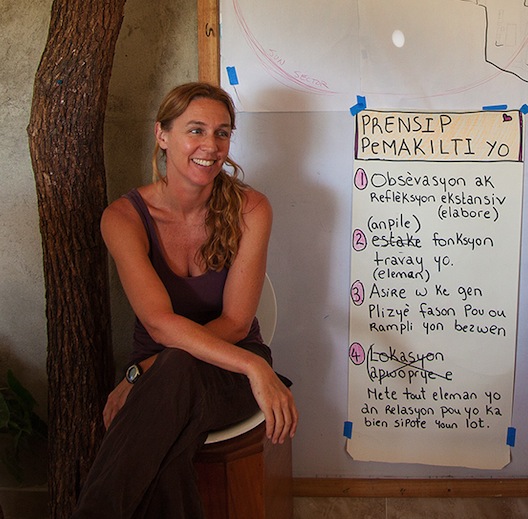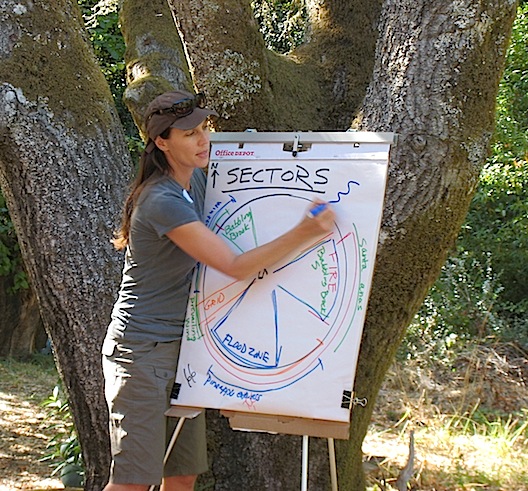Kendall Dunnigan
Resilient Communities Design & Permaculture Program Director
Kendall Dunnigan (she/her) is the Director of the Occidental Arts & Ecology Center’s Permaculture Program and co-teaches the Permaculture Design Certification courses with Brock Dolman. Her work focuses on facilitating collaborative ecological design processes with priority given to supporting economically and environmentally marginalized communities in the US, Latin America, and the Caribbean with a focus on indigenous communities, women’s leadership, and youth programs. Kendall is an ecologist and organizer with a degree in Environmental Studies from the University of California, Santa Cruz and a master’s degree focused on participatory community design. She holds a California teaching credential and a diploma of permaculture from PINA. Kendall has taught sustainable design at Dominican University and New College of California and environmental education at Walker Creek Ranch and OceanSong. She lived in Mexico and Guatemala working with indigenous Mayan communities on sustainable agriculture. She is co-author of the book Growing Communities: How to Build Communities Through Community Gardening. She is currently writing a book about Resilient Community Design. She lives at OAEC with her partner, Dave Henson, her son, Kelsey, and their pet cuys and quail.
KENDALL DUNNIGAN
Director del Programa de Diseño de Permacultura
Kendall Dunnigan (Ella) es el Director del Programa de Permacultura del Centro Occidental de Artes y Ecología y co-imparte los cursos de Certificación de Diseño de Permacultura con Brock Dolman. Su trabajo se centra en facilitar procesos de diseño ecológico colaborativo, dando prioridad al apoyo a comunidades económicamente y ambientalmente marginadas en los Estados Unidos, América Latina y el Caribe. Kendall es ecologista y organizadora con una licenciatura en Estudios Ambientales de la Universidad de California en Santa Cruz y una maestría enfocada en el diseño comunitario participativo. Tiene una credencial de enseñanza de California y un diploma de permacultura de PINA. Kendall ha enseñado diseño sostenible en la Universidad Dominicana y el Nuevo Colegio de California y educación ambiental en Walker Creek Ranch y OceanSong. Vivía en México y Guatemala trabajando con comunidades indígenas mayas en agricultura sostenible. Es coautora del libro Growing Communities: Cómo construir comunidades a través de la jardinería comunitaria. Ella vive en OAEC con su esposo, Dave Henson, su hijo, Kelsey, y sus conejillos y codornices.
On Staff Since: 2007 Email Phone: x116

In Their Own Words

My passions:
- My family
- Doing anything active with friends, especially hiking, gardening, kayaking, biking, Cuban salsa dancing, and gourd-crafting.
- Chocolate (not necessarily in that order)
My work in 6 or fewer words:
Facilitate bio-culturally regenerative human systems design.
My favorite color:
Dirt (in its many shades).
My preferred gender pronoun:
She or her.
My favorite resiliency resource:
Sun, wind, water, earth and all its inhabitants.
My work at OAEC:
I support place-based communities to design, implement, and evolve socially just and ecologically regenerative human settlement patterns based in natural systems and processes.
Why my work matters:
Two out of five people on the planet are water insecure today and that number will shoot upwards as the Himalayan glaciers and other glacier filled mountain ranges melt leaving large tracts of India and China and other snow-dependent water areas (such as California) without steady water flows. People all over world are already facing the impacts of climate chaos: larger storms, more flooding, longer droughts, less predictable weather systems, and crop failure. As climate chaos expands, more and more people will experience insecurity to their basic water and food needs. Every community has the right and the potential to address their ecological and economic needs and, ultimately, will be left to solve their own issues. I facilitate those processes that support communities to determine their needs, their ecological and social assets, and to re-weave themselves into reciprocal relationships with each other and upon which they depend.






